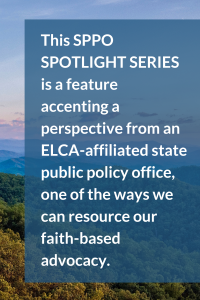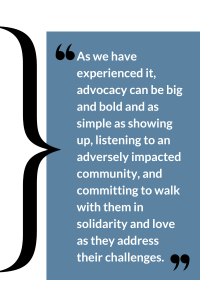By the Rev. Justin Eller, Assistant to the Bishop for Care and Community with the Southeastern Synod
If advocacy means loving our neighbors and working for justice with the “least of these” (all who are hungry, thirsty, newly arriving, vulnerable, sick or imprisoned – Matthew 25:40) then advocacy can be both general and particular.
The Southeastern Synod of the ELCA consists of congregations and faith communities across four states: Alabama, Georgia, Mississippi, and Tennessee. Each state has their own unique particularities and priorities, state legislative session dates and rhythms, and contextual challenges and opportunities. Instead of being a single ELCA-affiliated state public policy office (SPPO), we strive, as a four-state synod, to journey with residents, congregations and leaders as we navigate a wide variety of challenges.
OUR APPROACH TO ADVOCACY
In lieu of attempting to respond to every particular state legislative item, our Southeastern Synod’s advocacy work usually focuses on broader issues impacting our entire synod territory. Whether it’s marriage equality, food and medical insecurity, or supporting immigrant and refugee communities, our approach to advocacy, loving our neighbors, and working for justice, is to engage, equip, and empower.
Engage: We work with our congregations and leaders to engage in advocacy action and understand how advocacy is part of our baptismal growth in Christian faith and life, “to care for others and the world God made, and to work for justice and peace” (ELW, p.228).
Equip: We work to equip our congregations and leaders with quality information and training on advocacy-related issues as well as how to advocate at the local, state, and federal level. We have an Advocacy Policy Committee with representatives from our four states who help us put into motion ways we can advocate across our synod.
Empower: We work to empower our congregations and leaders to be active advocates in their context, to contact their elected officials and to speak with communities who are vulnerable and not speak for them.
The Southeastern Synod grounds our advocacy work in:
- Scripture that calls people of faith to care for the most vulnerable;
- Values of Accompaniment in the ELCA: mutuality, inclusivity, vulnerability, empowerment and sustainability; and
- ELCA’s MERGE Justice foci: Migration justice, Economic justice, Racial justice, Gender justice and Environmental justice.
WHAT DOES THIS LOOK LIKE IN ACTION?
So what does this style of advocacy look like?
- It looks like working with congregations and communities in our four states in emergency/disaster preparedness, whether from a hurricane, tornado or immigration enforcement action.
- It looks like the Southeastern Synod being the lead plaintiff in a lawsuit against the state of Tennessee over a new law that could put rostered ministers and congregations at risk for providing food, shelter or resources to undocumented immigrants.
- It looks like hosting virtual Lunch-and-Learn events, “Know Your Rights” and “Support Your Community” workshops and trainings to address root causes of systemic injustices.
- It looks like creating a network of congregations who have Matthew 25-like community-engaged ministries (such as ministries of feeding, clothing and shelter).
- It looks like participating as speakers at public witness events like the “Witness for Creation” event organized by Creation Justice Ministries
THE EXPERIENCE OF ADVOCACY
As we have experienced it, advocacy can be big and bold and as simple as showing up, listening to an adversely impacted community, and committing to walk with them in solidarity and love as they address their challenges. Advocacy can be expressions of social action and practices of faith.
Yet, in all of this faithful work, advocacy is what we get to do together and is our grateful response to God’s grace in Jesus Christ to love and serve our neighbor.


